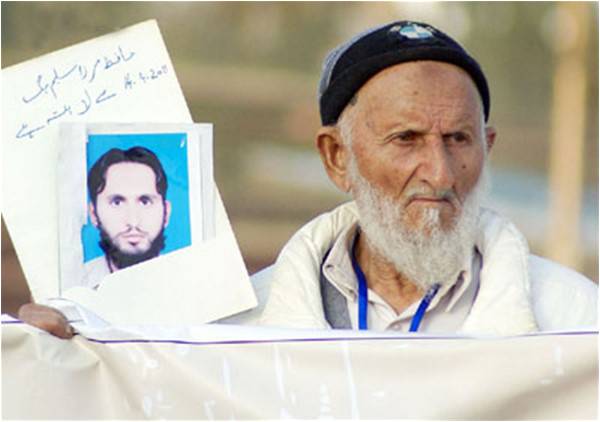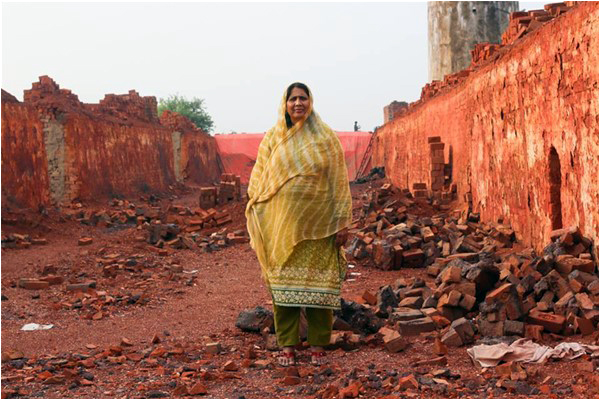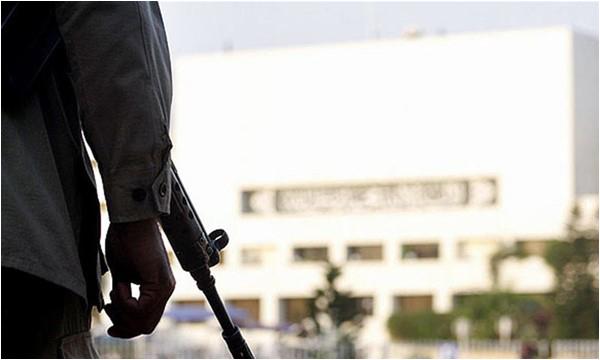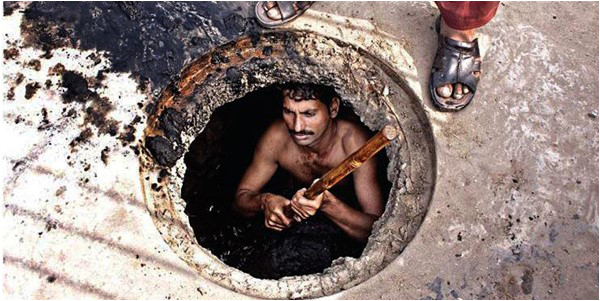
Missing persons
Sir,
A man named Yaseen Shah is among many others who no longer have an identity. He was taken away by the authorities with 34 prison fellows from an internment center; they became anonymous. This fact was revealed by the superintendent of the judicial lockup of Malakand: 35 missing persons, including Muhabat Shah, were in his custody. Where is Zeenat Shahzadi? No one has an exact answer. She was an educated journalist. How can she have been abducted? People just make an educated guess but in fact, she is no longer Zeenat Shahzadi. She has become part of the list of ‘unknown persons’ or ‘missing persons’.
Is the ‘security of a person’ inferior to the ‘sovereignty of the State’? Is ‘human integrity’ inferior to ‘territorial integrity’? One is forced to live in a state of exception each time. After exhausting domestic remedies one can try to approach an international platform. As the International Covenant on Civil and Political Rights (ICCPR) says in Article (4), the right to life also covers arbitrary deprivation of individual lives.
There is an urgent need for legislation about “enforced disappearances” in Pakistan. Because no law specifically deals with them, the authorities manipulate the justice system. The need is to ensure that the minimum standards of the covenant and treaties are fulfilled by the state. Pakistan needs not only to sign but also to ratify the First Optional Protocol of the ICCPR and open the door for individuals to be able to pursue violations with the Human Rights Committee.
We need to come up with a systematic procedure for redressing the issue of forced disappearances. Joichi Ito, the director of the MIT Media Lab says that, “If we destroy human rights and the rule of law in the response to terrorism, they have won.”
Khizer Hayat,
Via email.
Education crisis
Sir,
Education is the most powerful tool to change the world. Unlike other countries, Pakistan is facing an education crisis. The root cause is a lack of interest in promoting it. Similarly, there is a lack of research culture and our institutions are not listed at the top of the world’s 600 institutions. Most universities are just businesses. They are steeped in political influence. The literacy rate is just 35%. This can only be fixed by reforming the system. Teachers need professional training. Special attention must be given to personality development.
Haider Ali,
Via email.

Slavery
Sir,
They sweat at brick kilns, their fingers bleed at carpet factories. They scrounge amid piles of garbage for rags, metal and plastic. They toil as domestic servants. These are the lives of modern slaves in Pakistan, who labour relentlessly to feed themselves. Many are trapped in this vicious cycle and grow sick or deformed over the years of hard labour. Most of them, if not all have been strong-armed into their professions by some form of compulsion, whether from their families, from the social prospects affixed to their religion and caste, or from simple pecuniary necessity. As Pakistan turns 70, the Walk Free Foundation estimates that over two million men, women and children are living as modern day slaves.
Although Pakistan is a signatory to the ICCPR, there are alarming discrepancies between its pledges and its work on the ground. Article 8 of the ICCPR prohibits compulsory labour and slavery in all forms. Even so, over one percent of Pakistan’s population is subjected to some contemporary form of slavery. Laws meant to prevent bonded labour are flouted as the work continues dyeing raw hide in tanneries, rolling cigarettes in sweatshops, blowing glass in factories, moulding bricks or mining stone in hazardous quarries.
The 2015 Global Citizen award went to Syeda Ghulam Fatima for her work on bonded labour in brick kilns. Many saw this as a sign that Pakistan would be forced to better protect its citizens from abuse. According to the Global Slavery Index, Pakistan has relentlessly made it to the “Slavery`s List of Shame” for the third consecutive year in 2016.
Recognizing the state’s failure over the last seventy years to protect its subjects from modern forms of slavery, it is imperative that Pakistan signs the First Optional Protocol of the ICCPR. Doing so will guarantee aggrieved citizens access to the Human Rights Committee for violations committed under the covenant, consequently propelling the government to confront the predicament of bonded labour. Signing the Optional Protocol will not only address issues pertinent to bonded labour, but will also collaterally endorse the sanctity of numerous other rights guaranteed under the covenant. Failure to sign the option protocol will - as history dictates – lead to further stagnation.
Opponents argue that adhering to the First Optional Protocol will create an adjudicatory body above and beyond the state. This, however, is not the case. The Human Rights Committee’s authority is limited to advisory opinions. Furthermore, a cause of action can only be brought forth before the committee after all domestic remedies are exhausted. The First Optional Protocol does not endanger the sovereignty of Pakistan. The mere fact that well over a hundred sovereign states are party to it is testament to this.
Osama Shahid,
A senior year law student at LUMS.
Terrorism
Sir,
People across the globe are impatient to see an end to terrorism. Within the last two weeks, terrorism has been conveying its message. Over 125 have been killed and scores others injured. In 2016, 23 terrorist attacks were reported. The death toll was 1,803. Compared to that, 28 such incidents have taken place so far in 2017.
The Jamaat-ul-Ahrar and Tehreek-e-Taliban Pakistan have claimed responsibility.
In Quetta, a bomb squad officer and a policeman were killed trying to defuse a bomb. Two segregate attacks took place in Ghalani. Then Sehwan and Charsadda were attacked. Lahore has suffered.
Rameez Ali Mahesar,
M.Phil candidate
University of Sindh,
Jamshoro.
Nuclear weapons
Sir,
Today, there are more than 16,000 nuclear weapons globally. These weapons of mass destruction threaten our national security, pose a grave risk of humanitarian disaster and siphon billions in precious economic resources from the things that matter most.
We must not continue to pour more and more taxpayer money into these catastrophes that are waiting to happen. Instead, we should work urgently to eliminate the risks; and the only reliable, verifiable way to do that is to stop the spread of nuclear weapons, secure all nuclear materials and eliminate all nuclear weapons: “Global zero.”
What we need now is for countries with nuclear weapons to come together and begin discussing real, time-bound, actionable plans to eliminate them globally. It won’t happen overnight, but [we/our country] can get the process started and begin building a safer, saner world for this generation and all generations to come. We must not wait for the inevitable disaster, which could see a major city wiped off the map, before we act.
Abeer Naz,
Karachi.
American solutions
Sir,
The standing ovation US President Donald Trump received on February 28 after an address to the US Congress provides insight as to why the political establishment was at a loss during the presidential election campaign and when an outsider won. This presidential address is a recipe for surefire disaster for the US. Allow me to explain why:
First, Trump’s confusion is mainly due to a misunderstanding of American exceptionalism. Trump forgot that the UN is on US soil and the US is under obligation to practice American exceptionalism through the UN only. But on one hand Trump said that America is once again ready to lead and on other hand he said that it was not his job to represent the world; his job is to represent the United States of America. Trump does not evidently understand that American exceptionalism is precisely the political idea through which the world can be represented by the US president through the UN, while at the same time representing the US. Like previous US administrations, Trump also made this mistake because the US has been by-passing the UN and has formed any number of forums, platforms, alliances etc outside the UN.
Nobody says that Trump should not create jobs for Americans or should not eradicate unemployment. But Trump should also understand that unemployment has been caused by two reasons: As Trump has also said, due to unfair trade policies (of high tarrifs on US goods in many countries) and, the isolationist mindset of Americans who do not want to leave the US for jobs abroad. Rather the US, instead of investing in foreign companies, should have established American companies in foreign countries in which 10% to 20% of Americans could be accommodated as a condition to the investment. Therefore, instead of protectionism as a permanent solution to unemployment, the Trump administration should resort to economic protectionism only till new norms for fair policies about trade and natural resource utilization are decided after extensive discussion at the UN.
As far immigration laws are concerned, they are exclusively an internal matter and should be decided depending on what suits the US economically and in view of internal and external security. But illegal immigrants are a different matter. Trump is unnecessarily building a wall across the border with Mexico. In my view, Trump should ask Mexico to take the millions of illegal immigrants back and if Mexico refuses then the US should demand territory and/or exclusive mineral rights.
Exclusive private capital will not do. Rather State capital (born also out of fiscal deficit and deployed profitably especially for the eradication of unemployment) and people’s responsibility in a democracy for their health and education will be needed. Therefore Obamacare can be abolished but should not be replaced by what Trump suggested in his congressional address. Health care can be taken up by Americans through the ESI system (as is in India) but with the modification in which every employee and every employer will contribute and representatives of employees and employers (in addition to representatives of government) will be part of management.
In this address Trump spent quite some time on internal security, gun violence and radicalised terrorists. As far gun violence is concerned this is not a problem confined to the US. This problem can easily be solved if right to guns with non-lethal bullets is made a fundamental human right under the ICCPR of the UN.
As far radical Islamist global terrorism is concerned, Trump needs to do three things: Work on a one-state solution for Israel. End the bloodbath in North Africa and the Middle East (NAME) region starting from Syria. Without adhering to the absurd demand of the removal of Assad as president of Syria, Trump should move the UNSC to deploy the UN Peace Keeping Force (UNPKF, at least 2 million) and the UN Election Commission (UNEC, with at least 2 million in civilian assistance) to hold an election in Syria. These 4 million military and civilian personnel can be increased if needed. (This is not a huge number given that India provided about 2 million persons (mostly military) during World Wars I and II each to the British).
Hem Raj Jain,
Author of Betrayal of Americanism,
Bengaluru, India.

Military (In)justice
Sir,
On February 28, 2016, almost all parliamentary parties agreed to resurrect the military courts for another two years in order to eradicate terrorism. The revival of these courts will be affected by an amendment to Article 175(3) of the Constitution, mandating military courts to try persons “belonging to any terrorist group or organization.”
Military courts were set up in January 2015 for two years to try civilians engaged in terrorism. The constitutional amendment making this possible was validated by the Supreme Court. These military courts have not been working for a few months as their two-year term expired on January 7, 2017.
With their revival, the apprehensions surrounding their disregard for rights set forth in the International Covenant on Civil and Political Rights (“Covenant”) stand renewed. According to the Inter-Services Public Relations, (which is the only source of information on all trials conducted, evidence recorded and judgments rendered during these two years), out of 274 trials, 161 convicts were awarded the death penalty and 12 have been executed. Moreover, according to the International Commission of Jurists, these trials were conducted behind closed doors and even the National Human Rights Commission members were denied access. No judgement was made public [...] These circumstances problematize the independence and impartiality of military tribunals as guaranteed in Article 14 of the Covenant.
After the trials, 16 appeals challenging the death penalty were dismissed by the Supreme Court, holding that these opaque proceedings of military courts were, ironically, in consonance with the guarantees of due process of law.
In this context, the only recourse available to the victims is to be found in international law, particularly in the First Optional Protocol (“Protocol”) to the Covenant. Purporting to “achieve the purposes of the Covenant and the implementation of its provisions,” this Protocol empowers the Human Rights Committee (HRC) to hear and consider communication(s) from individual(s) alleging violation of rights set forth in the Covenant. However, even this forum is blocked to the respective victims as Pakistan has yet to recognize the competence of the HRC in this regard.
In the absence of any effective domestic remedies, civil society should encourage Pakistan to ratify the Protocol to afford appropriate remedies to these victims. Pakistan’s responsibility to recognize the competence of the HRC flows directly from Article 2 of the Covenant, which obligates the state to provide effective remedies if any of the Covenant guarantees are violated. If Pakistan refuses to ratify the Protocol, it is essentially refusing to fulfil its obligations under the Covenant.
Furthermore, Pakistan should take the ratification as an opportunity to send a positive message to the international community on its commitment to fundamental human values. The ratification is all the more necessary in light of the fact that Pakistan is already notorious for flagrant violations of human rights, including torture, persecution of minorities and discrimination. In most cases, the victims are systematically excluded from accessing the echelons of justice, and are thus denied the right to due process and, consequently, many other fundamental human rights as well. The ratification will signify Pakistan’s commitment to the guarantees of right to life, human dignity and due process of law, which will hopefully encourage international investors to invest in our emerging economy.
Moreover, even if the military courts are necessitated by the exigencies of the time, the state cannot be permitted to ignore blatant human rights violations which are characteristic of military tribunals. Pakistan can even extend conditional recognition to the competence of the HRC by raising some reservations such as Trinidad and Tobago have with regard to their use of the death penalty. The functions of the HRC in no way interfere with the territorial sovereignty of Pakistan: the HRC is not a judicial body; its judgements are not binding; and it relies solely on the communications by the author(s) and the state parties to arrive at its decisions. In the absence of any effective remedy, it is incumbent upon the state to ratify the Protocol, recognizing the competence of the HRC to hear and consider communications, alleging violation of rights guaranteed in the Covenant; because of what good is a right if no effective remedy is available in the face of its violation?
Asad Ullah Khan,
Second-year law
LUMS, Lahore.

Sweepers’ lives
Sir,
It was winter when I woke up at 5am to catch the bus to return to Liaquat University of Medical and Health Sciences, Jamshoro when I heard the familiar sound of someone cleaning the street outside my house with a broom.
Municipality sweepers clean each road and street of the town before the day starts. They are then assigned to clean all the drains of all types of waste, including fecal matter, urine, garbage, used injections, wrappers etc.
It is only in sweepers’ families in such rural areas where each member of the household starts working in sanitation as soon as they become adults. Almost every house hires a sweeper, typically a woman to clean their bathrooms and floors. Male sweepers do the same in government and private sector offices.
Mahatma Gandhi once said: “Sanitation is more important than political independence.” He was of the opinion that each person should be responsible for cleaning up the waste they make. In those days, manual cleaning was common for the disposal of human excreta from dry latrines and sewers. It often involved the most basic of tools such as buckets, brooms and baskets. Though times have changed and we now use vehicles every sweeper still uses these basic tools.
Whenever it rains a sweeper’s job multiples. Though the municipality helps clean main roads with machinery, the sweepers have to work harder in the streets. Sweepers who work at homes don’t get any weekly or monthly leave.
They face health hazards. Due to the continuous exposure to dust and dirt, they are prone to develop respiratory ailments. They also develop diseases, particularly of the gastrointestinal system, associated with the transmission and handling of fecal material.
Despite this work, they make very little. What is more they are considered dirty. It is an irony that even though they maintain the cleanliness, they are not allowed to go about the very same houses they clean when rituals are taking place. They are given separate utensils to drink water. They are not allowed to live among the people they serve and are forced to live in separate residential colonies on the outskirts of town. The son or daughter of a sweeper can dream of no other work than sanitation.
No country progresses where there is discrimination among persons due to their profession. It is time to recognize their contributions to society and respect them as equal citizens.
Subash Maghnani,
Mithi, Tharparkar.

